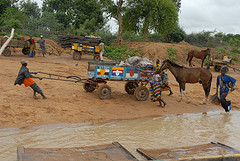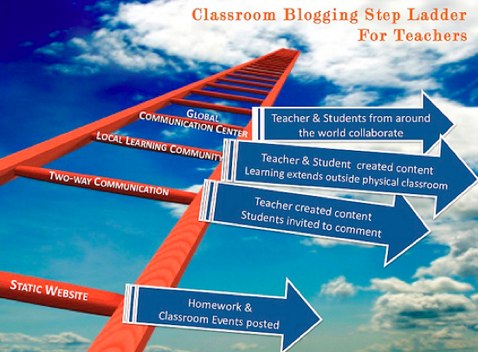Web Literacy and Differentiated Teacher Blogs

Cross posted to Langwitches Blog
According to Technorati, who published the 2009 State of the Blogosphere there are more than 133,000,000 blogs. In my Google Reader, I am subscribed to and read over 500 blogs, on Twitter I receive hundreds of daily recommendations to read a this blog post or another. I am comfortable in reading and writing in a medium that I did not grow up with, nor I even have heard of 10 years ago.
But... we can't assume...
In a recent blog post What Does It Mean To Be Literate, I wrote
We can’t just assume that every teacher is web “literate”. Before we start talking about how blogging can support 21st Century skills for their students, we need to step back and make sure that the teachers are literate (enough) to be able to read and write through this medium called a blog!
We cannot assume either... ...that parents are able to find and navigate a classroom site built on a blogging platform (reverse chronological order, categories, tags, etc) nor understand the pedagogical reasons behind blogging (beyond just using the latest buzzword of mainstream media). The lack of parent literacy in new media forms was what inspired me to write Dear Parents: Moving to a Classroom Blog.
As I was reading Will Richardson's post "Reading Screens, Writing Screens, Teaching Screens" a red flag went up for me as he asks:
Tools and ideas to transform education. Sign up below.
Are reading and writing changing in these linkable, screen centered environments? If so, does the way we think about reading and writing literacy have to change to embrace these shifts? If so, what are we doing about that? Right now, I think the answer in most schools is “not much.” In fact, I’m not sure many even realize the extent to which this shift is occurring.
The sentence, I honed in on, is the last one "I'm not sure many even realize the extent to which this shift is occurring". I agree that many schools, teachers and parents are not realizing the gap that is widening in terms of reading and writing literacy. If a teacher is not aware of the shift occurring, nor is "literate in these new environments", then how can we ask him/or to blog? Can we "push" him/her into using a blog platform as a two way communication tool and global communication center and expect the platform to be more than simply replacing the papers in the "Friday Folder" or the static one way school website? Richardson asks "What are we doing about this shift in reading and writing literacy"? For the last weeks/months, I have been involved in addressing the BASICS of maneuvering a blog
- setting up classroom blogs, adding users, entering titles and taglines
- doing workshops for teachers on the Nuts & Bolts of logging in, posting and editing
- explaining the difference between posts and pages
- initiating some teachers in the world of widgets (and even a little HTML)
I am looking at my Langwitches Blog and its categories and am realizing that the "Blogging" category has the most postings (Over 100!). Part of these posts is a "Blogging with your Students" unit to make it easier for classroom teachers to get started. Among them you will find post titles such as:
- Getting to Know Your Blog: A Beginner’s How-To-Guide
- Blogging -Connecting Your Class to The World
- Continue Blogging With Your Students
- Taking Student Blogging to the Next Level?
- Blogging Activities and Competitions
- Setting Up the Blog And Getting Started
I am also realizing that these posts are intended for teachers to get their students blogging. I have neglected to address the needs of the teachers to learn about
- Basic Vocabulary (addressed partly in What Does It Mean To Be Literate)
- A new writing genre
- Blogging Etiquette
- Online Safety
- Blogs as communication platform
- Blogs as information/material/resource hub for parents and students
- Blogs as global communication centers
What am I doing about bridging the gap of paper based reading and writing in our school towards the shift of digital, hyperlinked, connected and collaborative writing? After having a thought provoking conversation about this topic this past week with the new Head of School, I am realizing that I need to take a step back, as a PD leader, and articulate a plan to guide teachers in their own journey. We need to differentiate Professional Development and individualize goals for steadily moving towards becoming literate in new forms of digital reading and writing and how this applies to instructional practice.

Image licensed under CC by Emilio Labrador
I can't put the cart before the horse and throw teachers into blogging and expect them to use the "tool" beyond their own literacy. Differentiated PD might have to "lower" the expectations (for some) of using a blog to its fullest instructional potential (right away). It is a process...The idea is that everyone is moving in the right direction. Differentiated PD might have to "lower" the expectations (for some) of using a blog to its fullest instructional potential (right away). It is a process...The idea is that everyone is moving in the right direction.

- Using blogs might mean for one teacher to learn how to log in and update weekly homework assignments, upcoming class events, important information.
- It might mean to subscribe to and read, via an RSS Reader, other classroom blogs.
- Some teachers might be ready to extend the resources available in the classroom to pre-select links to outside curriculum related sites, activities and content.
- It might mean for another teacher to learn how to create and embed multimedia on the blog to include photo slideshows, VoiceThread, student created videos or podcasts.
- Yet another teacher might be ready to allow a two way communication to open on her blog, where teacher and students have a conversation and students are contributing to the academic content to their online classroom learning community.
- Maybe one teacher is ready to make their blog a global communication center that invites global voices to contribute multiple perspectives and encourages healthy discussion beyond the physical classroom walls.
I would like to hear your ideas and thoughts regarding Will's questions: What are we doing about this shift in reading and writing literacy"? and what is your reaction to my statement "I can't put the cart before the horse and throw teachers into blogging and expect them to use the "tool" beyond their own literacy." What are you already doing? Where do we start?
